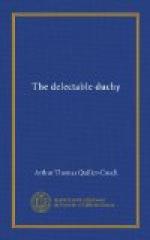“Tolerable, though I’m no hand at spellin’.”
“Very well. We’ll have a drink together at St. Austell, an’ while we’re there you shall do up Geake’s notes in an envelope with a note sayin’ your compliments, but on second thoughts you couldn’t think o’ takin’ his money.”
Bricknell’s face fell somewhat.
“You gowk! You’ll have twenty-five pound’ o’ mine in exchange: solid money, an’ my own earnin’s. I’ve more ’n that in my pocket here.”
“But I don’t see why you should want to give me money.”
“An’ you’m too mad to see if I explained. ‘Tis a matter o’ conscience, an’ you may take it at that. When the letter’s wrote—best not sign it, by the way, for fear of accidents—you give it to me an’ I’ll see Geake gets it to-night. After that’s written I’ll pay your fare to Liverpool, an’ then you’ll get a vessel easy. Now I see your mouth openin’ and makin’ ready to argue—”
“I was goin’ to say, Long Oliver, that you seem to be actin’ very noble, now: but ‘twas a bit hard on me, your holdin’ your tongue as you did.”
“So ’twas, so ’twas. I reckon some folks is by nature easy forgotten, an’ you’m one. If that’s your character, I hope to gracious you’m goin’ to keep it up. An’ twenty-five pound’ is a heap o’ money for such a man as you.”
“It is,” the wanderer asserted. “Ay, I feel that.”
At twenty minutes to five that evening, Long Oliver pulled up again by the green garden-gate. William Geake from his workshop had caught the sound of the mare’s hoofs three minutes before, and awaited him.
“One, two, three, four, five.” The notes were counted out deliberately. Long Oliver, having been thanked, gathered up his reins and suddenly set them down again.
“Dear me,” said he, “if I hadn’ almost forgot! I’ve a letter for ’ee, too.”
“Eh?”
“Iss. A kind of a sailor-like lookin’ chap came up to me i’ the Half Moon yard as I was a takin’ out the mare. ‘Do you come from Gantick?’ says he, seein’ no doubt Farmer Lear’s name ’pon the cart. ’There or thereabouts,’ says I. ‘Know Mister W. Geake?’ says he. ‘Well,’ says I. ‘Then, if you’re passin’, I wish you’d give ‘en this here letter,’ says he, an’ that’s all ’e said.”
“I wonder who ’twas,” said Geake. But his face was white.
“Don’t know ’en by sight. Said ’e was in a great hurry for to catch the up train. Which puts me i’ mind I must be movin’ on. Good-night t’ye, neighbour!”
As soon as he had turned the corner, Geake opened the letter.
* * * * *
When Naomi returned, half-an-hour later, she found him standing at the gate as if he had spent the day there: as, indeed, he might have, for all the work done to the coffin.
“I must bide up to-night an’ finish that job,” he said, when they were indoors and she began asking how in the world he had been spending his time. “I’ve been worryin’ mysel’ all day.”




